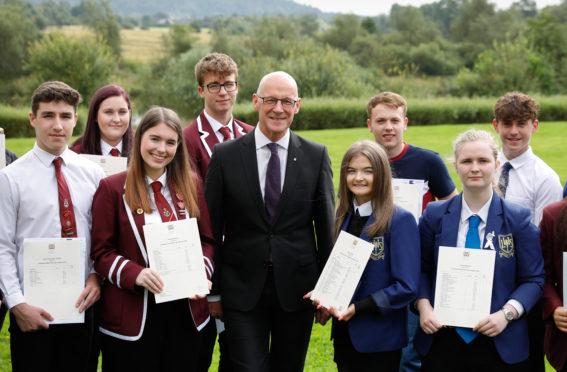
Exam pass rates have fallen at every level except National 5, according to this year’s Scottish Qualifications Authority (SQA) results.
More than 136,000 candidates who have completed SQA exams, courses and awards this year received their results on Tuesday.
Year-on-year pass rates are down at National 2 by 2.6%, National 3 by 3.6%, National 4 by 2.6%, Higher by 2% and Advanced Higher by 1.1%.
The only stage at which the pass rate increased compared to 2018 was at National 5, with 78.2% of pupils achieving grades A-C, up 0.7%.
National 5 improvements include an increase of 4.4% in passes for English and a 1.3% rise in maths, with entries up by 2.4% overall.
Pupils taking Higher courses fell by more than 6,000, down from 191,951 in 2018 to 185,914 in 2019, with the pass rate down 2% to 74.8%.
The attainment rate at Higher has now fallen for four consecutive years but Education Secretary John Swinney defended the results, arguing if pass rates were to regularly increase “people would rightly question the robustness of our assessment system”.
Mr Swinney, who was visiting pupils receiving their results at Forth Valley College in Stirling, said: “Congratulations to the pupils who have worked so hard and achieved so much this year.
“Thank you to all our teachers, lecturers and SQA staff for their dedicated support throughout the past twelve months.
“These are a strong set of results which show a degree of year-on-year variation expected in a high performing education system with credible assessment.”
“I am pleased to see an overall rise in the pass rate for National 5, with increases in passes for maths and English.
“At Higher level we have seen a welcome upturn in the collective number of passes for the sciences – something we have focused our efforts on for some time.”

He added: “Our learners now have a much wider range of choice than ever before, allowing them to find the route into employment or further education that is right for them.
“There has been a sustained increase in the number of skills-based qualifications, with 54,406 awards achieved this year, more than double the figure attained in 2012 and a rise of over 4,000 awards on last year.
“While three-quarters of Higher candidates gained a pass at A-C, there has been a fall in the overall pass rate.
“This year for the first time we saw the removal of unit assessments at Higher level, a move that was broadly supported by the education sector.
“If the pass rate only ever went up people would rightly question the robustness of our assessment system.
“We need to continue to ensure teachers have the right support in place to help them provide the best learning and teaching experiences for our young people.”
The Deputy First Minister added the planned review of the Curriculum for Excellence’s senior phases should help politicians understand how it is being implemented in schools and “identify any areas where we can collaborate with the education system to further improve the quality of education for our pupils”.
Scottish Labour congratulated pupils getting their results but warned falling pass rates at Higher were now “an established trend”.
The party’s education spokesman Iain Gray said: “We want to have an education system where all young people can achieve their potential.
“However, the trend of falling attainment in Scottish education for the last few years is now the norm.
“These results show a fourth year of falling attainment in what the Government calls the ‘gold standard’ Higher qualification.
“Years of sustained cuts to schools, thousands fewer teachers and the narrowing of the curriculum are failing our young people.”
He added: “John Swinney has been warned year after year that these are the real issues facing our schools but instead he focuses on unwanted and unneeded governance ‘reforms’.
“It is long past the time he took his failings seriously and urgently tells pupils, parents and teachers what he intends to do to reverse these trends.
“Failing to do so will simply fail more young people.
“Our exam results continue to do great credit to the hard work of our teachers and young people.
“They deserve a Government that backs them with the resources our schools need.”

Skills Development Scotland (SDS) said expert careers advisers will be on hand from 8am to discuss with pupils their next steps.
Director of career information James Russell said: “If your results aren’t what you expected don’t panic, you have lots of options.
“Our experienced advisers are here to help you and your parents and carers with information on all the options and opportunities available to you.”
NSPCC Scotland counsellors are also poised to help any young people worried about their results via the Childline service.
The SDS helpline will be available from 8am to 8pm on Tuesday and Wednesday, and from 9am to 5pm weekdays from Thursday until Wednesday August 14. The number to call is 0808 100 8000.
Childline’s free confidential helpline number is 0800 11 11.

Enjoy the convenience of having The Sunday Post delivered as a digital ePaper straight to your smartphone, tablet or computer.
Subscribe for only £5.49 a month and enjoy all the benefits of the printed paper as a digital replica.
Subscribe